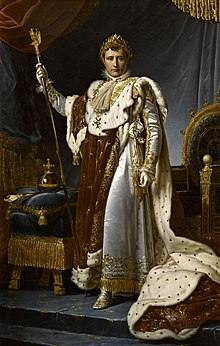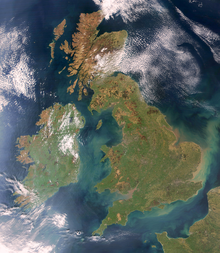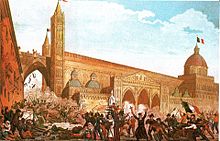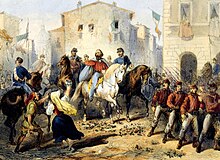History of Bourbon Sicily
Spain possessed in 1700 the largest empire in the world: present to some degree on all continents, and suffocated at home by clear political and commercial decadence, its legacy attracted the major European powers, just as it was of great concern in whose hands such dominion would pass.
The powers had united by forming the Quadruple Alliance: the British, French, Germans and Dutch at war with the Spanish, stipulated that the crown of Sicily should go to the Emperor of Austria, since the Savoy on their own could not protect the Mediterranean island from the sights of Philip V of Bourbon's army.
[13] Maffei at the same time ordered his men to set out for Syracuse, which, unlike Palermo and other Sicilian cities, had been fashioned over the centuries by the Spaniards with the main purpose of resisting the enemy to the bitter end, so it was evaluated by the Piedmontese king (for several years already)[14] as the best place in which to entrench and wait for events to unfold.
The new territorial arrangement, however, did not satisfy the major houses of Europe,[16] and the reason for ousting Austria from Sicily was given by the War of Polish Succession, which erupted in 1733: the new Austro-Russian-Prussian alliance, formed by the Treaty of the Three Black Eagles (Bund der drei schwarzen Adler),[17] had sided with the candidate Augustus III of Poland, outraging France, which instead supported Louis XV's father-in-law, Stanislaw Leszczyński.
Since the French were unable to counter the troops of Anna Ivanovna Romanova (Empress of All Russia), who had brought Poland into her orbit, they then decided to attack Charles VI's possessions, thus substantiating a new war in Sicily, the purpose of which was to take it away from the Germanic Empire.
[18] This pact promised the King of Spain's eldest son born to his second wife, the Duke of Parma and Piacenza, Charles Sebastian of Bourbon, the southern European domains of the Holy Roman Empire, i.e., both Kingdoms of Naples and Sicily, which were, however, to be kept strictly separate from the Spanish throne.
The Spanish troops, now allied with the French as well as the British, had landed on the western side of the island since the summer of '34 and, having conquered the area without difficulty (except for Trapani, also a fortress, which held out), had appointed the Duke of Montemar, José Carrillo de Albornoz as the new viceroy of Sicily.
[22] From this time onward the heavy siege of Syracuse began, concentrating on it the Hispanic crown's aims: after having the population forcibly evacuated to the neighboring countryside, Germans and Spaniards opened fire on the city, and from May, for 24 days, the artillery of the Ejército de Tierra poured inside the walls; approximately 2000 bombs were dropped there.
[23] At the same time that palaces, roads and various structures were being destroyed, there came from the German emperor a kind of incentive for the Syracusans: he promised them, in the event of victory, the restoration of the city as the capital of Sicily as a reward for their loyalty to the Austrian Empire.
Maria Carolina noted that the young consort was totally uninformed, to the point that: Esteeming Sicily as much as Capri or Procida, he would have been able, between the lack of enlightenment and the haste to move on to kill a gazette, to grant that kingdom as a fief to any of his henchmen.Like his father, he also attempted to reform Sicilian laws, but failed against baronial power: on September 19 and 20, 1773, there was a popular insurrection in Palermo, which broke out because of the death of the president of the city's Senate, Cesare Caetani, prince of Cassaro.
[73][74] Nonetheless, Napoleon Bonaparte seemed to have a dearth of information about the state of the Mediterranean island, evidence of which is the barrage of questions he asked his brother Joseph about everything related to Sicily, the answers to which were to enlighten the French, showing them how to move about in it.
[81] Collingwood, although he showed sincere interest in the vicissitudes of the city that housed the command of his fleet, was actually there for other reasons, and when he wrote to Sir William Drummond of Logiealmond (British minister at the Bourbon court, Elliot's successor) that same day, he did so in very different tones, expressing the need for Britain to be able to count on the Sicilians to counter the expansionist ambitions of the French: Syracuse is so particularly situated, and so much may depend on the exertion of its people, that I should conceive that a policy the reverse of diminisging its power, a policy to aggrandise it, to increase its population, and to attach them strongly, and by every means, to the true interests of their Country, would, in the course of events, be found hightly beneficial.
However, despite pressure from Robert Adair (British plenipotentiary to the Habsburg-Lorraine court in Vienna) and the command of the Lordships, Collingwood struggled to perform what was required of him, as he glimpsed, even at that time, the rifts that would later lead to a final break between Napoleon and Alexander.
Cultural contact between the natives and the occupiers therefore grew, and as political tensions matured throughout the island, the Sicilian question, that is, its fate when the long war would finally come to an end, struck a chord with the British government thanks largely to the circulation of a book, Historical survey of the foreign affairs of Great Britain, written and published in London in 1808[96] (and republished in 1810)[97] by a Scottish military man and landowner named Gould Francis Leckie, who had lived from 1801 to 1807 in the Aretusean fief of Tremilia, which he had leased, by emphyteusis.
[99][100] Leckie forged close relations with the Syracusans to such an extent that he asked to join the city's “mastra nobile” (governing body), which was not granted to him, as the local nobles viewed his meddling in Aretusian politics with suspicion.
[102][107] After various constitutional discussions, Lord William Bentinck then arrived in the summer of 1811: commander-in-chief of the British forces of Sicily, brigadier general in the army of Arthur Wellesley, 1st Duke of Wellington and minister plenipotentiary at the Bourbon court in Palermo.
In this context, the work done by the Syracusan Tommaso Gargallo should be noted, who was at the center of a “resounding prohibition”[116] imposed on one of his sonnets criticizing the submission of his sovereigns to the British; comparing the monarchy to a hanged man whose rope was in the hands of Britain.
Meanwhile, King Ferdinand, whom Bentinck had forced to abdicate (officially Ferdinand had said he was ill and thus forced by ill health to retire) to complete the Sicilian constitution in 1812, giving the powers of the alter ego to the son of the ruler Francis I, had embarked on a love affair with the Sicilian noblewoman Lucia Migliaccio, 12th duchess of Floridia and princess of Partanna (a title derived from her first marriage to Prince Grifeo, whose widow she remained):[note 8] the two were married in November 1814, in great secrecy, in Palermo, just two months after Maria Carolina's death, to the strong disapproval of Francis I (which gave rise to all the accusations of libertinism circulating about the Syracusan woman),[119] who never accepted Lucia's entry into the royal family.
Suspicions erupted into scandal when the crown prince made public a letter that the Lord had sent him as he was about to arrive in Syracuse (on December 3, 1813),[123] in which he suggested that Francis I renounce Sicily; cede it to England and obtain monetary compensation in return.
Nor were these words spoken solely by Lord William Bentinck, for even before him, other distinguished English figures dispatched from London to the island had expressed the same concept, wishing for annexation: it is worth mentioning in this regard the military engineer Charles Pasley, who with his writing An Essay on the Military Policy and Institutions of the British Empire (the first of its kind on geopolitics, in which it was stated, in clear terms, that England should annex Sicily to the United Kingdom)[128] was together with the Scotsman Leckie the most influential promoter regarding the possible future of a Sicily united with the British Isles.
Both the Russian ambassador Dimitrij Pavlovič Tatiščev[133] and the member of the French royal family, Duke Louis Philippe of Orléans,[134] warned the Bourbons several times, firmly claiming that the British, and in particular the military and plenipotentiary Lord William Bentinck, were plotting a covert plan to take possession of Sicily, but before these alleged plans could somehow be implemented, Napoleon's fall occurred, which upset everything: the general signed the so-called Treaty of Fontainebleau on April 14, 1814, by which, to obtain peace and an end to the war, he abdicated and handed himself over to the British, who exiled him to the island of Elba.
[144] The Sicilians, already disillusioned by the return to absolute monarchy, did not accept the union and soon rose up: And as there were many disturbances in Messina, Catania and Syracuse, where the rebellion went so far as to insult the legitimate authorities by shouting forbidden words and destroying the insignia of the government, many troops were sent from Naples, together with the Marquis Del Carretto, Minister of State for the General Police, to whom, by a royal decree of July 31st, all the powers of the Alter Ego were transferred for the valleys of Messina, Catania and Syracuse, to restore peace and tranquillity and to animate the good men to a wise conduct.
[168] Ferdinand, in anticipation of a potential invasion, given the high tension of the moment, dispatched soldiers to the island's fortresses, with the task of resisting a possible British aggression (in the continental part of his kingdom, militant incidents had already occurred between Neapolitan merchant ships and His Britannic Majesty's warships).
The inhabitants of the fortress, highly skeptical about the chances of success of this eventual war (considering that the United Kingdom of Queen Victoria had no rivals on the seas and only France was at that time able to hold, with difficulty, a lead over the English), had no illusions when the king promised clear improvements in social conditions, as they took those words of his as dictated solely by fear of the ongoing situation.
[171][172] Finally, the war between the British Empire and the Kingdom of the Two Sicilies did not break out, thanks to the mediation of France, which succeeded in soothing the tempers of the respective parties to the dispute and advised Ferdinand to cancel the contract he had made with his own people, so as to settle the sulfur issue once and for all.
From '38 to '48 Sicilian revolutionaries had held numerous meetings among themselves, in which the independence hypothesis had been increasingly affirmed (as early as '40 the order of uprising had been established: Palermo would rebel first, then Messina would follow, then Catania, then Syracuse and finally Trapani, seeking to involve the continental part of the Bourbon Kingdom as well).
"[178] The revolutionary uprisings of 1848 also marked the return of the British to the island: Britain, concerned about possible interference by other powers in the Sicilian question, first intervened by bringing military and mediators to the cities of Sicily that had already seen their stay during the Napoleonic period.
The duke had also been to Sicily in person; he had been there in 1845, accompanying the Russian imperial Romanov family, and in the city of Palermo he fell in love with the tsar's daughter, Olga of Russia, whom he was ultimately unable to marry because of the princess's failure to convert to Catholicism.
Tensions that threatened to resurface, since King Ferdinand II of Bourbon had already warned Charles Albert that if his son accepted the throne of Sicily, Naples would declare war on Piedmont[186] (which would go against the union that the Italian states were trying to establish among themselves).
[187] Ferdinand II of Bourbon did not wait any longer: in the late summer of 1848 he prepared his own expedition to reconquer rebellious Sicily and at the beginning of September sent his men to Messina; he was facilitated by the fortress of the same name, which, unlike in Syracuse, had not been disarmed and had always remained ready to fire: only the armistice had so far held it back.





























